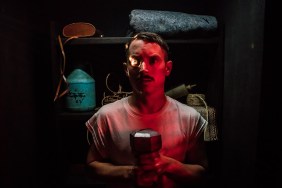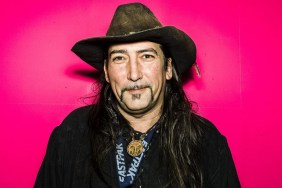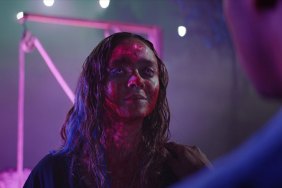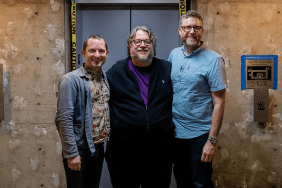
Talking with the team of SpectreVision – Elijah Wood, Daniel Noah and Josh C. Waller – is like sitting down with some of your best genre-loving friends and talking about horror. The conversation might take many tangential turns, but it’s driven by intelligence and enthusiasm for horror. While attending the Stanley Film Festival over the weekend, Shock Till You Drop finally had the chance to speak with this triumvirate about the heartbeat at SpectreVision’s core.
Big things have been happening at the company since it landed on the scene. Two of its films, Cooties and A Girl Walks Alone Home At Night, have hit the festival circuit. Another, Toad Road, is on VOD and LFO was recently acquired by MPI/Dark Sky Films. Meanwhile, The Boy, starring Rainn Wilson, David Morse, Mike Vogel, Zuleikha Robinson and Bill Sage, is production.
Wood, Noah and Waller are taking part in an exciting time for horror and they’re coming at the genre that’s personal and unique.
Ryan Turek: Horror is getting a significant boost in quality from the indie scene, or I should say, smaller distributors and production companies, do you agree? Where do you think this movement is coming from?
Daniel Noah: I agree, but it’s not just limited to horror. It’s this problem with the artistic economy we’re living in. The studios have painted themselves into a corner where they can’t afford to do anything except giant franchises.
Elijah Wood: There’s no middle ground.
Noah: There isn’t. Movies that were studios films in the ’70s – Kramer vs. Kramer – where would that live today? Forget genre for a second. If you want to make it a character-driven movie, you have to make it indepedently.
Wood: Ordinary People.
Noah: Yeah, stuff like that.
Turek: Today, that would be films like Short Term 12.
Noah: Yes! That would be a studio film back in the ’70s.
Wood: I adore that film.
Turek: When SpectreVision was launched, what was your goal? Because the films you’re at work on are across the board. Obviously, it’s stuff you personally want to see…
Wood: It’s pretty selfishly-driven. [laughs]
Waller: It always stems from there, first. Whatever excites us as fans. If we read some script where we’re like, “I’ve never seen this movie before…” we’ll do everything we can to get it made. Another sub-goal is we deeply care about the filmmakers we’re surrounded by. People at this festival, they’re such wonderful people and are passionate about what they want to do. We know how hard it is to get movies made, so why not help? Why not do it together?
Wood: When we started the company, it was a passion for the genre and, at the time, we’ve seen the landscape totally change the last four years. When we started, no one was really doing it. Blumhouse was really the only company that was making horror films of interest. There was no real space to make these kinds of genre films, they were mainly happening in Europe. And we were inspired by that. These things need to happen there.
Waller: You’d get the occasional Ti West or Larry Fessenden movie, but there wasn’t a wave that was happening.
Wood: And we’ve seen over the last four years these little companies start up. That’s fantastic. Look at Sundance, out of the midnight section there were genre films…it’s very exciting.

Turek: It’s also exciting because there were genre films not just on their midnight slate, but genre films were bleeding into other SXSW programs. They were not bound by just the “midnight programming.” Talk about the filmmakers you’re working with such as Ana Lily Amirpour who directed A Girl Walks Home Alone at Night.
Wood: We’re obsessed with that movie.
Noah: Yeah, Amirpour… Mozhan Marno, who is an old friend of mine and appears in the movie, we were having a drink one night and I told her what we were doing. She told me she was attached to this Iranian vampire movie and that it sounded like something we’d be interested in. She asked me if I wanted to read it and we all did. You could just instantly tell that this woman was inevitably going to be a major force. And the movie came together really quickly. Sina Sayyah, her producer, went out and raised the money – we’re executive producers on the film. It’s having this incredible life and it’s thrilling to see that.
Wood: That movie exemplifies part of our interest in starting the company, which is to support filmmakers we believe in. Sitting at the screening at Sundance, there was tremendous pride. It made me emotional and hit to the point of what we’re trying to do.
Noah: We ended up working with one first time filmmaker after another, which was never by design. We respond to passion and we respond to people calling over and over again.
Waller: That tends to be a first time filmmaker thing because you’re hungry, but it doesn’t just apply to first time filmmakers because Leigh Whannell and Ian Brennan [of Cooties] are the exact same way. Leigh is a spaz.
Turek: That’s refreshing to hear that, as producers, you’re taking a chance on first-timers because sometimes producers simply want to work with filmmakers with a ton of experience and track records.
Waller: Screw track records.
Wood: You can feel it, man. When a director, who’s talking about their work and their vision, you can feel what they’re capable of.
Waller: A lot of the problems first time filmmakers experience is simply because of production things we can help avoid. It’s all about surrounding them with the right support group. We’ve got you, we’re going to protect you.
Noah: The other thing is that Waller and I are both directors, what I always like to point out to financiers when they mention first time filmmakers is that they may have forgotten other first-timers like Orson Welles, Sam Raimi, everybody starts somewhere!

Turek: What are your plans for SpectreVision with the brand? Do you want to venture into other mediums?
Wood: Our interest is to definitely establish…we’ve only got one movie out, really.
Noah: Toad Road.
Wood: I feel like we’ve got a bit of time to put films out. So that’s our focus.
Noah: We’re taking it slow. We do have a music division, music management. We represent composers from around the world who are making studio albums. Neo-classical, electronic, avante garde… They’re not necessarily known by people who hire composers. Music is important to us and it’s a primary element of seeing a movie. Too often, with due respect to the masters, for 40 years movies have sounded like John Williams, Hans Zimmer and those guys will go down in the history books. But there’s a lack of imagination with film music. They go to what inspired them.
Turek: Or it’s a lack of theme and all mood. I ranted a bit about this on the site a few months back…
Wood: Yes, less theme for sure. Mostly sound design.
Turek: Talk about The Boy project which is…
Wood: Ambitious. [laughs]
Noah: We saw this short called Henley that Craig Mcneill and Clay McLeod had made. And it was about a lonely, slightly disturbed young boy who lived in a rural area with his dad in a motel who gets a little too interested in roadkill. They wanted to turn it into a feature and sort of envisioned it as a comedy. We read it and said, “Hmm, we might have a different interest in this.” We pitched them the idea of turning it into a psychological thriller/horror film. This portrait they made looked like, maybe, what Ted Bundy looked like when he was 8 years old. It’s consistent with what we’re trying to do which is take familiar tropes and do something different with them. We’ve seen every take on a serial killer, but we’ve never seen a childhood story. The film was fairly inexpensive and the idea of doing a film and watching this kid grow up and knowing it’s going to end horribly and to treat it seriously was cool.
Turek: This has been envisioned as a trilogy. Are you shooting the films back-to-back?
Waller: No, we’re spacing them out. We’re almost done with the first one. We were down in Colombia and built an entire American motel from the ground up in the middle of Colombia. The different ages we have are 8, 13 and 18. It’ll have to be a different actor.
Noah: The idea is to do one a year but we’re talking about doing part 2 and 3 back-to-back.

Turek: Another film you have on your slate is It Was Cruel from Shadow of the Vampire director E. Elias Merhige. What can you tell me about that one?
Wood: We love Begotten. One of the most disturbing, extraordinary movies.
Noah: It’s a tough one. [laughs]
Waller: People like Elias…we’ve got this balance of working with first time directors and then working with trend-setters.
Noah: Masters. We’re not ready to announce it just yet, but we’re doing a film with a major horror director from all of our childhoods.
Waller: The projects on the IMDb are valid. Some are further along than others. We don’t ever give up on our projects.
Wood: Cooties took three years.
Noah: And the film we’re making this summer with Jorge Michel Grau, Curse the Darkness, that one has been the longest.
Wood: Four years, I think.
Noah: It’s a difficult film. Ethnic cast, which can be difficult to finance, unfortunately, we just hung in there. It’s too good and it means too much to us. We make promises to filmmakers and we like to keep them.
Waller: There’s also something about walking up with a check – someone who we’ve been wanting to work with or someone who is our friend – and saying, “Here you go!” Not that it’s a big cardboard check… [laughs]
Wood: It’s only 50 bucks, but it’s something.
Noah: This is to your agent, this is to the IRS, here’s what’s left. [laughs]
Many thanks to the SpectreVision fellas for chatting with Shock.
Photo credit: James Dimagiba









